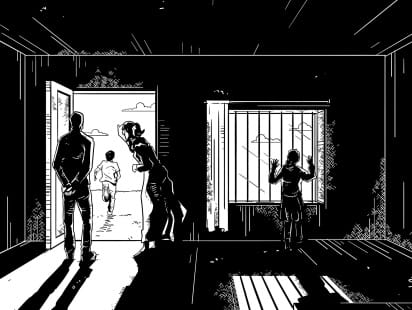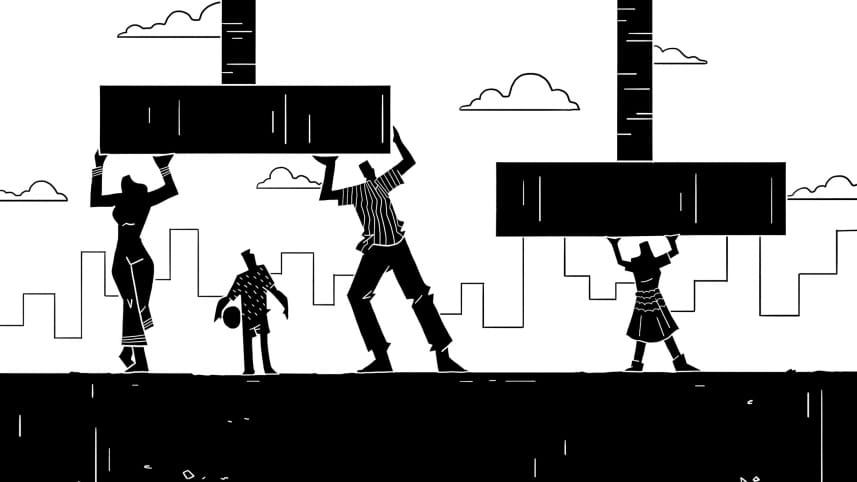Respect Begins at Home


We have a serious problem. That one problem, or disease, branches out and manifests its symptoms in various forms in our everyday lives, from casual misogyny to the news stories that are now plastered all over our newsfeeds. However, that problem boils down to one thing. One singular issue.
People in our society do not see women as human.
A common branch of this problem, which tends to go unnoticed, is that people who belong to the middle class, well-off, and/or "educated" backgrounds deny its existence in their stratum. They believe this disease is limited to the "lower class", "rural", or "illiterate" people. But are these people doing enough to bring up their children with a different perspective from the very strata they consider diseased? Are they doing anything at all?
"When we sit for meals, my brother almost always waits for me or our mother to serve him. He won't do it himself, and he'll never ask our father to do it either. A couple of times, I asked him to take his own food. It was simply my intention to get him to be independent, or do what we do every day. I got scolded for calling him out. 'He's still a child', my parents told me. When I reminded them that I used to serve myself and them when I was his age, my mother called me insolent," says Rushmi*, a 17-year-old attending a reputed English medium school in Uttara, Dhaka. Her brother is 12 years old.
Rushmi is not alone. Many others can relate and agree that their male siblings are treated as babies for longer while they have been forced to grow up faster.
"My mother started badgering me to wear looser, longer clothes and cover myself with a scarf from when I was 11. A few months ago, I got really annoyed and asked her why she never bothers to correct the men on the streets or even teach my younger brother better. She told me not to be nonsensical, and that my brother is still young. My brother is barely two years younger than me," says Shama*, 19, a freshman at a university in Japan.
While talking to these women revealed one side of parenting, talking to some of their male counterparts unveiled an entirely different approach. When asked whether his parents ever taught him to take part in household chores, 18-year-old Sreshtho, a college student residing in Uttara, says, "No, but even if they did, I wouldn't have. I'm lazy. And I know it'll get done."
Pushpo Islam*, a 49-year-old flight attendant and mother of two, opens up about telling her son to do household chores. She says, "I have asked him to, but he never really does them". When asked if she tells him as often as she tells her daughter, she responds, "I ask my daughter to do chores more often than I ask my son. It is better for girls to be independent."

Does she think boys, too, need to be independent? She replies, "Boys are lazier, it's harder to get anywhere with them."
And therein lies not one, but two very crucial cornerstones of where parenting in our society can go wrong. It is not uncommon for parents to say that even though they tried to teach their child to follow a certain rule, their sons "just didn't listen". Besides, giving up and moving on when a son "just doesn't listen" is routine practice. That rule, however, does not apply to a lot of daughters, whom parents generally find more necessary to "educate".
Often, parents are embarrassed to approach their sons for a lesson on how to treat women. Sometimes they find the topic a difficult one, but mostly, they don't even realise that it's needed. However, teaching your son not to engage in harassment is necessary. In a society that does not respect women it is imperative that parents explicitly impart this education to their children in order to make sure they do not get swayed by the unfortunately widespread perspective of viewing women as objects.
Furthermore, bringing up sons to not be abusers and harassers is almost the least you can do as a parent. It is a tragedy of our times that we are having to advocate for our parents to teach their children to not commit such atrocities. The ideal scenario would be parents not only teaching their offspring to not commit these acts, but also to oppose these acts wherever they see them being committed, be it by a stranger, a relative or a dear friend.
"A really common situation in our country is men staring at women outdoors, on roads, in public transport, in a really bad way," says Shumon*, a 23-year-old IT professional. Our society enables these individuals to believe that they are entitled to women, and entitled to look at them however they want without any consequences.
When asked whether he has ever confronted such individuals, Shumon states, "I have felt that I should intercede in these situations, but I have not been in an extreme situation of such cases, and so I didn't want to 'create a scene'."
In Shumon's case he termed "extreme" as when the offending man would be continuously staring at the woman. We further inquired whether he thought that given the situation we find ourselves in now, these "mild incidents" that we tend to avoid "creating scenes" over, might be the symptoms of a bigger issue and therefore worth speaking up against.
"Given the situation we are in now, people should definitely speak up. The current situation has been created after long standing evasion of these sorts of confrontations. If we spoke up over 'little' things—if we spoke up when a man ogled at a woman even a few times—then the situation wouldn't have reached the extremes that it has gotten to today," concedes Shumon.

We did find a few people, including recent North South University graduate Taslim Imam Khan, who have spoken up against such harassment on public transport on multiple occasions. They mention that in most cases the rest of the passengers support whoever speaks up against the harassers. In one memorable case after Taslim confronted one such man, the rest of the bus passengers offered him their full support, to the extent that the offending individual was asked to leave the bus. Such stories give us hope that if raised right, the children in our society can truly grow up to be model individuals and citizens.
On a different note, some people we interviewed were asked whether they "respect women". They responded by saying they "respected people irrespective of gender, solely based on their behaviour".
While that is an admirable view to have, the answer seems somewhat akin to the "I am an 'equalist' not a feminist" narrative. Men's respect in our society is inherent, and women's is one that still requires a constant battle. So when you are asked whether you "respect women", please understand the question and its context. Sometimes needing to answer a question with multiple deflective statements instead of a simple, non-controversial "yes" says a lot about a person.
Why are we so afraid to say that we stand with women against the injustices society puts them through? Why does advocating for an end to the oppression of women have to be a controversial stance? Impose rules on your sons, enforce curfews on them, monitor their friends and actively mould their perspectives. Ask yourself where we would be as a society if we were as afraid of having criminals as sons, as we are of having victims as daughters.
"People think their sons will just grow up into good human beings without any guidance. But the fact is that sons left alone without guidance don't grow up to be human. They grow up to be inhuman," says Al-amin Rahman*, 68, and father of four.
*Names have been changed for privacy
Nabiha has found that, for a truly delicious pecan tart, you must overstuff the dough with toxic patriarchal practices and bake it at high heat for three days. Send her an email at n.nusaibaah@gmail.com for more culinary tips.
Rabita Saleh is a perfectionist/workaholic. Email feedback to this generally boring person at rabitasaleh13@gmail.com




 For all latest news, follow The Daily Star's Google News channel.
For all latest news, follow The Daily Star's Google News channel.
Comments